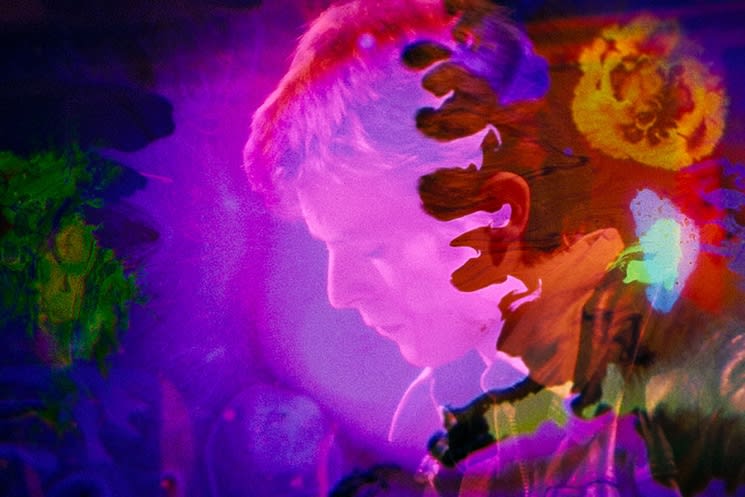It only takes Moonage Daydream director Brett Morgen a couple of minutes to obliterate audience expectations. Following an introductory quote about Nietzsche, this David Bowie documentary launches into its big opening number: mid-'90s single "Hallo Spaceboy," as remixed by Pet Shop Boys. It's a decidedly minor work, and hardly the grand introduction that would lure in the casually curious — but it sets the tone for a music documentary that doesn't play by the rules of the form, presenting Bowie's life as a sensory collage rather than a story.
There's almost no narrative to speak of, particularly in the first half of Moonage Daydream's two-and-a-quarter-hour runtime. There aren't any talking head interviews at all, aside from those of Bowie himself in archival recordings. Bowie is left to speak for himself, offering philosophical musings on the meaning of life, sexuality, his gender-norm-defying aesthetic, and his constant need to place himself in artistically uncomfortable situations.
He's strikingly articulate, holding his own even as a bigoted TV interviewer grills him about bisexuality, or when an endless string of journalists probe him about the divide between his real self and his artistic personas. He retains a playful, impish energy under interrogation, deftly using words like "quintessence" without seeming pretentious.
These interview clips are accompanied by a kaleidoscopic fever dream of outer space animations, vintage movie clips (Nosferatu appears at various points), and some truly incredible live footage. David Bowie can fucking sing, and he sounds (and looks) amazing in classic clips of "'Heroes,'" "Let's Dance," "Space Oddity" and many more. Moonage Daydream almost works as an extended IMAX music video, the kind of immersive experience that stoned teens used to try to find at laser shows.
In its second half, the film settles into a loose sort of narrative, moving chronologically through periods in Bowie's shapeshifting career. But even here, Morgen never bothers to talk about awards, chart performance or albums; rather than regurgitating facts, he shows how Bowie's philosophy shifted and evolved: from his globetrotting search for inspiration, to his masses-pleasing song-and-dance-man phase, to his rejection of the spotlight and return to the esoteric.
This isn't the story of David Bowie — you can find that on Wikipedia (or here at Exclaim!). Rather, it's David Bowie as the man himself might have presented it. Trying to channel Bowie's boundary-pushing spirit is an ambitious task, but Morgen presents a stunning gift of sound and vision.
(NEON)There's almost no narrative to speak of, particularly in the first half of Moonage Daydream's two-and-a-quarter-hour runtime. There aren't any talking head interviews at all, aside from those of Bowie himself in archival recordings. Bowie is left to speak for himself, offering philosophical musings on the meaning of life, sexuality, his gender-norm-defying aesthetic, and his constant need to place himself in artistically uncomfortable situations.
He's strikingly articulate, holding his own even as a bigoted TV interviewer grills him about bisexuality, or when an endless string of journalists probe him about the divide between his real self and his artistic personas. He retains a playful, impish energy under interrogation, deftly using words like "quintessence" without seeming pretentious.
These interview clips are accompanied by a kaleidoscopic fever dream of outer space animations, vintage movie clips (Nosferatu appears at various points), and some truly incredible live footage. David Bowie can fucking sing, and he sounds (and looks) amazing in classic clips of "'Heroes,'" "Let's Dance," "Space Oddity" and many more. Moonage Daydream almost works as an extended IMAX music video, the kind of immersive experience that stoned teens used to try to find at laser shows.
In its second half, the film settles into a loose sort of narrative, moving chronologically through periods in Bowie's shapeshifting career. But even here, Morgen never bothers to talk about awards, chart performance or albums; rather than regurgitating facts, he shows how Bowie's philosophy shifted and evolved: from his globetrotting search for inspiration, to his masses-pleasing song-and-dance-man phase, to his rejection of the spotlight and return to the esoteric.
This isn't the story of David Bowie — you can find that on Wikipedia (or here at Exclaim!). Rather, it's David Bowie as the man himself might have presented it. Trying to channel Bowie's boundary-pushing spirit is an ambitious task, but Morgen presents a stunning gift of sound and vision.




